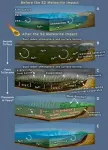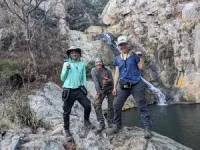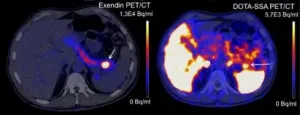(Press-News.org) Two faculty members at the Johns Hopkins University School of Medicine and the Johns Hopkins Bloomberg School of Public Health have been elected to the National Academy of Medicine (NAM), an independent organization of leading professionals from multiple scientific fields including health, medicine and the natural, social and behavioral sciences. NAM serves alongside the National Academy of Sciences and National Academy of Engineering to provide objective advice for the nation and international scientific communities.
An announcement of 100 new members was made Oct. 21.
Being elected to NAM is considered one of the highest honors in health and medicine. Current members elect new members based on their major contributions to advancements in medical science, health care and public health.
The following are the new members from Johns Hopkins.
Christopher Chute, M.D., Dr.P.H., is the Bloomberg Distinguished Professor of Health Informatics. He also has primary faculty appointments at the Johns Hopkins schools of medicine, public health and nursing. He is the chief research information officer for Johns Hopkins Medicine, deputy director of the Institute for Clinical and Translational Research at Johns Hopkins, co-chair of the Johns Hopkins Data Trust’s research subcouncil, and head of the biomedical informatics and data science section in the Division of General Internal Medicine. The National Academy of Medicine has recognized Dr. Chute for his work on how clinical data is represented to support data inferencing and discovery science in the learning health system, focusing on ontologies, classifications and real-world data. He chaired the World Health Organization’s International Classification of Diseases’ 11 revision, which transformed the century-old system to support data science, and he co-leads many large-scale national repositories of electronic health record data to advance outcomes research. His work has led to many discoveries that have changed clinical practice. Dr. Chute joined the Johns Hopkins faculty in 2015.
Jeffrey Rothstein, M.D., Ph.D., is a professor of neurology and neuroscience at the Johns Hopkins University School of Medicine. Also at Johns Hopkins, he is the founder and director of the Robert Packard Center for ALS (amyotrophic lateral sclerosis) Research, director of the Brain Science Institute, and the founder and co-director of the ALS clinic. He is also a member and ex-executive of the American Association of Physicians, an honorary medical society with members who are physicians with outstanding credentials in basic or translational biomedical research. His lab first discovered that excitotoxicity might be a common pathophysiological process in sporadic ALS, which led to riluzole for ALS. Dr. Rothstein made discoveries on fundamental pathways that underlie familial and sporadic ALS, including excitotoxicity, astroglial dysfunction, oligodendroglial dysfunction, and the role of nuclear pore complex and nucleocytoplasmic transport in familial and sporadic ALS. The author of more than 360 research articles on ALS pathophysiology and on basic neuroscience, Dr. Rothstein is also the founder and director of the Answer ALS program, which combines longitudinal clinical data, at home smartphone data collection and generation of induced pluripotent stem (iPS) neurons from more than 1,000 U.S. ALS patients, and their comprehensive biological analytics, leading to a dataset of 6 billion biological and clinical data points per patient.
END
Two Johns Hopkins faculty members elected to National Academy of Medicine
2024-10-21
ELSE PRESS RELEASES FROM THIS DATE:
Sweetened beverage taxes decrease consumption in lower-income households by nearly 50%, UW study finds
2024-10-21
Eight cities in the United States have implemented taxes on sugar-sweetened beverages, which contribute to health issues including obesity and Type 2 diabetes.
New research from the University of Washington investigated responses to sweetened beverage taxes using the purchasing behavior of approximately 400 households in Seattle, San Francisco, Oakland and Philadelphia – all of which recently introduced beverage taxes. The study was published online Sept. 30 in Health Economics.
Researchers found that after the tax was introduced, lower-income households decreased their purchases of sweetened beverages by nearly 50%, while higher-income households reduced purchases by 18%. Since ...
Black patients more likely to die after coronary bypass surgery
2024-10-21
PHILADELPHIA — Despite advances in cardiovascular medicine, Black patients are 22% more likely than white patients to die in the hospital after coronary artery bypass grafting (CABG) surgery, according to a study of more than 1 million patients presented at the ANESTHESIOLOGY® 2024 annual meeting.
“Our large study shows that disparities in cardiovascular health care delivery in the U.S. are ongoing, especially in Black patients,” said Vinicius Moreira, M.D., lead author of the study and chief anesthesiology resident at Advocate Illinois Masonic Medical Center, Chicago. “We found Black patients who have ...
The transformative power of film
2024-10-21
A new study has found that after watching a docudrama about the efforts to free a wrongly convicted prisoner on death row, people were more empathetic toward formerly incarcerated people and supportive of criminal justice reform.
The research, led by a team of Stanford psychologists, published Oct. 21 in Proceedings of the National Academy of Sciences (PNAS).
“One of the hardest things for groups of people who face stigma, including previously incarcerated people, is that other Americans don’t perceive ...
What happened when a meteorite the size of four Mount Everests hit Earth?
2024-10-21
Billions of years ago, long before anything resembling life as we know it existed, meteorites frequently pummeled the planet. One such space rock crashed down about 3.26 billion years ago, and even today, it’s revealing secrets about Earth’s past.
Nadja Drabon, an early-Earth geologist and assistant professor in the Department of Earth and Planetary Sciences, is insatiably curious about what our planet was like during ancient eons rife with meteoritic bombardment, when only single-celled bacteria and archaea reigned – and when it all started to change. When ...
Weather-changing El Niño oscillation is at least 250 million years old
2024-10-21
DURHAM, N.C. – The El Niño event, a huge blob of warm ocean water in the tropical Pacific Ocean that can change rainfall patterns around the globe, isn't just a modern phenomenon.
A new modeling study from a pair of Duke University researchers and their colleagues shows that the oscillation between El Niño and its cold counterpart, La Niña, was present at least 250 million years in the past, and was often of greater magnitude than the oscillations we see today.
These temperature swings were more intense in the past, and the oscillation occurred even when the continents were in different places than they are now, according to the study, which appears the week ...
Evolution in action: How ethnic Tibetan women thrive in thin oxygen at high altitudes
2024-10-21
Breathing thin air at extreme altitudes presents a significant challenge—there’s simply less oxygen with every lungful. Yet, for more than 10,000 years, Tibetan women living on the high Tibetan Plateau have not only survived but thrived in that environment.
A new study led by Cynthia Beall, Distinguished University Professor Emerita at Case Western Reserve University, answers some of those questions. The new research, recently published in the journal Proceedings of the National Academy of Sciences of the United States of America (PNAS), reveals how the Tibetan women’s physiological ...
Microbes drove methane growth between 2020 and 2022, not fossil fuels, study shows
2024-10-21
Microbes in the environment, not fossil fuels, have been driving the recent surge in methane emissions globally, according to a new, detailed analysis published Oct 28 in the Proceedings of the National Academy of Sciences by CU Boulder researchers and collaborators.
“Understanding where the methane is coming from helps us guide effective mitigation strategies,” said Sylvia Michel, a senior research assistant at the Institute of Arctic and Alpine Research(INSTAAR) and a doctoral student in the Department of Atmospheric and Oceanic Sciences at CU Boulder. “We need to know more about those emissions to ...
Re-engineered, blue light-activated immune cells penetrate and kill solid tumors
2024-10-21
HERSHEY, Pa. — Immunotherapies that mobilize a patient’s own immune system to fight cancer have become a treatment pillar. These therapies, including CAR T-cell therapy, have performed well in cancers like leukemias and lymphomas, but the results have been less promising in solid tumors.
A team led by researchers from the Penn State College of Medicine has re-engineered immune cells so that they can penetrate and kill solid tumors grown in the lab. They created a light-activated switch that controls protein function associated with cell ...
Rapidly increasing industrial activities in the Arctic
2024-10-21
The Arctic is threatened by strong climate change: the average temperature has risen by about 3°C since 1979 – almost four times faster than the global average. The region around the North Pole is home to some of the world’s most fragile ecosystems, and has experienced low anthropogenic disturbance for decades. Warming has increased the accessibility of land in the Arctic, encouraging industrial and urban development. Understanding where and what kind of human activities take place is key to ensuring sustainable development in the region – for both people and the environment. Until now, a comprehensive assessment of this part of the world has ...
Scan based on lizard saliva detects rare tumor
2024-10-21
A new PET scan reliably detects benign tumors in the pancreas, according to research led by Radboud university medical center. Current scans often fail to detect these insulinomas, even though they cause symptoms due to low blood sugar levels. Once the tumor is found, surgery is possible.
The pancreas contains cells that produce insulin, known as beta cells. Insulin is a hormone that helps the body absorb sugar from the blood and store it in places like muscle cells. This regulates blood sugar levels. In rare cases, the beta cells malfunction, resulting in a benign tumor called ...







